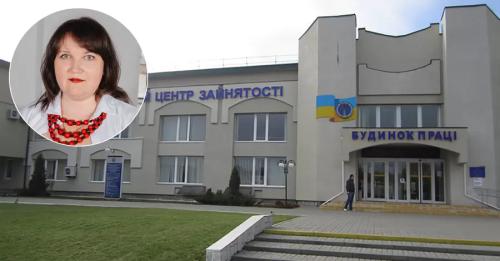“Photo: lpnu.ua / FB Nataliya Slynko The Ukrainian labor market, like the country in general, is going through difficult times. Even at the end of 2023, experts predicted a significant shortage of personnel, and this really became a big problem for the market. According to research by GRC.UA, six out of ten domestic companies face a shortage of personnel for all categories of employees. At the same time, experts say, the Ukrainian labor market today […]”, — write: businessua.com.ua

Photo: lpnu.ua / FB Natalia Slynko
The Ukrainian labor market, like the country in general, is going through difficult times. Even at the end of 2023, experts predicted a significant shortage of personnel, and this really became a big problem for the market. According to research by GRC.UA, six out of ten domestic companies face a shortage of personnel for all categories of employees. At the same time, experts say, today’s Ukrainian labor market cannot be unequivocally called a market of employers or a market of job seekers. On the one hand, business experiences a shortage of personnel and difficulties in recruiting personnel, and on the other hand, many specialists face difficulties in finding employment.
To what extent do specialists on the market meet the needs of employers? How is the blurring of boundaries between “male” and “female” professions? Why did the war make employers more flexible and what does this mean specifically? These and other questions are addressed by the editors Briefly about discussed with director of the TalentMatch consulting company, HR expert Natalia Slynko.
About the results of 2024 and the implementation of forecasts– Mrs. Natalia, what, in your opinion, are the main results of the Ukrainian labor market in 2024? Have there been any new trends as a result of the war?
– The main conclusions can be considered an increase in the shortage of good specialists on the market, as well as an increase in the refusal of candidates from offers – this is a bright trend that did not exist before. Candidates consider several offers at the same time and can choose competitors. Everything is important: the possibility of booking, and wages, and working conditions, and the ability to work remotely, and the social package.
Also, the searchers are careful about the choice of people with whom they will work – both the manager and the team are important. There are cases when a person resigns in a few months only because he did not like the colleagues and the atmosphere in the office.
– Did the forecasts given by the experts at the end of 2023 come true? What changed last year compared to 2023?
– One of the main forecasts for 2024 was related to an increase in the deficit in the labor market. In the autumn of 2023, Ukrainian enterprises intensified their struggle for survival, and it was possible to predict that the search for a job would be more difficult. And so it happened, and mobilization changes, reservation laws and the introduction of the “Reserve+” registry only worsened the situation.
Another important forecast was about salary growth, and it came true 50/50. Currently, the shortage of personnel persists not only due to a physical shortage of workers, but also because job seekers and employers do not find an agreement on the size of wages. Many employers simply cannot afford to compete on wages.
About job seekers and employers– To what extent do specialists on the market today meet the needs of employers?
– There are good specialists on the market, it cannot be said that the qualified personnel have all left or all have been mobilized. But they know their price. And when such specialists go on an active search, have many offers, then they choose.
As for unqualified specialists, recently, instead of recruiting young specialists and gradually training them in business processes, employers are increasingly trying to automate tasks using artificial intelligence. But here it must be said that in the long run, enterprises that save money on training young people will still lose the battle as a whole. Because in 5-7 years they will have no one to attract. They will not be able to afford qualified specialists if they are not trained today.
I also cannot help but say about the expectations of some employers who live in some parallel reality and make demands on candidates that should not be there at all – from a certain age to possessing all possible skills. It seems that in the process of accepting the inevitable, they never got out of the first stage – denial.
– And what are the expectations regarding unemployment? Will it grow?
– Unemployment may increase, because some entrepreneurs will go into the shadows. Some FOPs have already closed their businesses, some will close in the near future due to new taxes and will look for employment. But not all employers today are ready to employ employees officially. We seem to have plunged into the 90s, when the labor market was recovering and just returning to a civilized framework, and many people agreed to work informally.
That is, we are currently observing a paradox: on the one hand, there is not enough specialists and they can choose, on the other hand, there is not enough work for those who were previously self-employed and are now looking for work.
– Is there a market for employers or job seekers in Ukraine today?
– There is no clear answer to this question. From the point of view of search and choice, it is a seeker’s market, because he decides who he will go to. From the point of view of wages, this is an employer’s market, because the offer is limited here.

During the war, many women mastered the seemingly “unfeminine” profession of truck driver. Photo: FB Reskilling Ukraine
About changes in the labor market– Now we are watching how women’s professions become masculine (for example, men at supermarket checkouts and teachers), and men’s professions become feminine (for example, drivers). But in Europe, there has been no such division for a long time, and there men calmly sit behind cash registers, and women drive buses. Can we talk about the fact that we were also on the way to such “erasure of borders”, and the war simply accelerated everything?
– I would say that employers have finally started to see a candidate first of all as a specialist and a person, not his gender. We have not yet reached except for teachers and nannies in kindergartens. That’s when it will happen, we will be able to say that we have overcome discrimination based on gender. And for now, it’s a long way to go as we mature as a society.
– Experts often say that the war made Ukrainian employers more flexible, and what does this mean specifically?
– As I already said, many employers cannot afford to compete with salaries, so flexibility in working conditions has really appeared. Today, you can combine jobs, apply for a part-time job. By the way, part-time employees are often hired to be sure that a person is guaranteed to work and perform a certain volume work And this model of division of reserved workers between several enterprises will continue in the future.
Outsourcing tasks is also popular. Companies hire freelancers who can work remotely. Of course, most employers would like to see employees in the office, but in the current environment, they are ready for a more flexible work model.
What’s more: now we are on the threshold of a step when employers will be ready for flexible working hours. I can already see large companies offering to choose working hours when production processes allow it. First of all, it is suitable for students, young mothers, pensioners who work as much as they can. They get paid for these hours, and the rest of the hours are covered by the company with other employees. Unfortunately, there are fewer opportunities for companies to hire people full-time.
– How often, according to your observations, do businesses go into the shadows today and what are the main reasons?
– Employers simply hide some employees from mobilization. That is, they are involved in work unofficially and recommend not to leave the house. But the main reason for the growth of shadow employment is the tax policy. New taxes drive business into the shadows – this is our reality.
Source: kp.ua